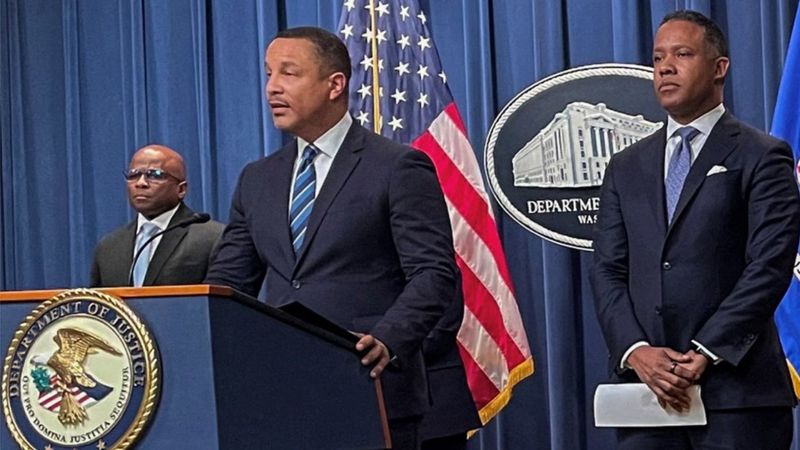Last updated on April 23rd, 2024 at 09:11 am

The blockchain-cryptocurrency industry has been making waves in the world of finance, disrupting traditional systems and opening up a new world of possibilities. Despite its many benefits, this budding industry is not immune to challenges, the most notable of which is the potential for it to be used to conceal fraudulent financial activities due to its inherent element of anonymity.
The anonymity offered by cryptocurrencies makes them a desirable tool for individuals looking to conceal fraudulent financial practices. It’s a double-edged sword that has both facilitated groundbreaking advancements in finance and created opportunities for illegal activity.
Financial fraud in the crypto space reached new heights in recent years, with a surge in activity attributed to complex economic and political forces. Consequently, law enforcement agencies from coast to coast have stepped up their game to combat this alarming trend, launching a slew of high-profile regulatory actions against the industry’s biggest players.
Headlining the showdown is the U.S. Department of Justice (DOJ)’s high-stakes case against former FTX CEO Sam Bankman-Fried. The US SEC also joined the fray, taking legal action against crypto lender Genesis and crypto exchange Gemini over the sale and offer of unregistered securities to the public.
The U.S. Treasury Department has also added its voice to the chorus, with sanctions against the privacy-focused mixer Tornado Cash, and state-level actions against Celsius Network. The latest in this string of legal actions is the DOJ’s case against the Hong-Kong based crypto company, Bitzlato.
On January 18, 2023, the US DOJ issued a statement revealing that the founder and majority shareholder of Bitzlato Ltd., Anatoly Legkodymov, had been charged with “Unlicensed Money Transmitting” based on evidence showing that his company allegedly processed more than $700 million worth of illicit funds.
The authorities have consequently seized and suspended Bitzlato’s operations, describing the company activities as “fuelling a high-tech axis of cryptocrime.”
This unprecedented crackdown on financial fraud in the crypto space is sending a clear message: “the crypto industry isn’t the Wild West.” With so much happening in the crypto world, it’s clear that the regulatory landscape is constantly evolving and that no one is immune from scrutiny.
The gnawing question is: What exactly does the Bitzlato case portend, and how will the lawsuit impact the crypto space?
This article offers an in-depth analysis of the DOJ’s lawsuit against Bitzlato and its implications for the crypto industry. As the regulatory landscape continues to evolve, the ramifications of this lawsuit will likely set the stage for the future of financial compliance in the crypto world.
About Bitzlato and Its Alleged Criminal Activities
Bitzlato, before its shutdown, was a bustling hub for cryptocurrency enthusiasts. The firm, established in 2015, basically operated as a crypto exchange and peer-to-peer (P2P) platform enabling the purchase and sale of cryptocurrencies at 0% commission.
The platform prided itself on its user-friendly mobile app, which not only allowed for easy storage of cryptocurrencies in a wallet but also enabled anonymous transactions without the need for identity verification.
Bitzlato was also known for its secure chat feature, where traders could communicate with each other in a protected environment to keep their information safe.
But beyond its attractive features, Bitzlato had a dark side that would eventually lead to its downfall; the platform was notorious for its lax approach to user identification.
With its weak identity verification process, Bitzlato was seen as a platform that prioritized anonymity over security. In fact, many users were able to trade without providing any form of identification at all. And even when identification was required, the KYC/AML process was relatively weak and easily circumvented.
The DOJ statement included additional details about Bitzlato’s poor user verification and illegal activities:
“. . .As a result of these deficient know-your-customer (KYC) procedures, Bitzlato allegedly became a haven for criminal proceeds and funds intended for use in criminal activity. Bitzlato’s largest counterparty in cryptocurrency transactions was Hydra Market, an anonymous, illicit online marketplace for narcotics, stolen financial information, fraudulent identification documents, and money laundering services that was the largest and longest-running darknet market in the world. Hydra Market users exchanged more than $700 million in cryptocurrency with Bitzlato… Bitzlato also received more than $15 million in ransomware proceeds.
Bitzlato’s customers routinely used the company’s customer service portal to request support for transactions with Hydra, which Bitzlato often provided, and admitted in chats with Bitzlato personnel that they were trading under assumed identities. Moreover, Legkodymov and Bitzlato’s other managers were aware that Bitzlato’s accounts were rife with illicit activity and that many of its users were registered under others’ identities… Legkodymov was repeatedly warned by colleagues that Bitzlato’s customer base consisted of “addicts who buy drugs at [] Hydra” and “drug traffickers”… An internal spreadsheet saved in Bitzlato’s shared management folder encapsulated the company’s view of itself: “Positives: No KYC. . . . Negatives: Dirty money. . . .”
Additionally, a report from the US Treasury Department exposed Bitzlato’s close links to illicit financial networks in Russia.
The DOJ’s Statement on the Charges
The statement released on the DOJ’s website alleged that the 40-year-old Anatoly Legkodymov, a Russian national residing in China, operated an illegal enterprise through Bitzlato that processed more than $700m (£567m) in illicit funds and violated anti-money laundering regulations.
Legkodymov, who was arrested in Miami and scheduled for arraignment in a U.S District Court, also reportedly wrote to a colleague through Bitzlato’s internal chat system in 2019, describing the business as one which catered to “known crooks” using others’ identity documents to register their accounts. The existence of such correspondence indicated that Legkodymov was aware of the questionable nature of the individuals using his platform.
The US Attorney for the Eastern District of New York, Breon Peace, stated thus in the press release: “Institutions that trade in cryptocurrency are not above the law and their owners are not beyond our reach. As alleged, Bitzlato sold itself to criminals as a no-questions-asked cryptocurrency exchange, and reaped hundreds of millions of dollars’ worth of deposits as a result. The defendant is now paying the price for the malign role that his company played in the cryptocurrency ecosystem.”

Lisa Monaco, the US Deputy Attorney General added;
“Today the Department of Justice dealt a significant blow to the cryptocrime ecosystem. Overnight, the Department worked with key partners here and abroad to disrupt Bitzlato, the China-based money laundering engine that fueled a high-tech axis of cryptocrime, and to arrest its founder, Russian national Anatoly Legkodymov. Today’s actions send the clear message: whether you break our laws from China or Europe—or abuse our financial system from a tropical island—you can expect to answer for your crimes inside a United States courtroom.”
A Video Explaining The US DOJ’s Bitzalo Lawsuit
According to Monaco, the defendant allegedly “helped operate a cryptocurrency exchange that failed to implement anti-money laundering safeguards and enabled criminals to profit from their wrongdoing, including ransomware and drug trafficking.”
However, as is the standard in legal actions and criminal cases, the charges filed in the complaint against Legkodymov are merely allegations, and the defendant is presumed innocent unless and until proven guilty. If he ends up being convicted on the merits of these allegations, he could face a maximum penalty of five years in prison.
Inside The Bitzlato Operation
The Bitzlato Operation was primarily led by US and French authorities, with substantial support from the European Union police agency (Europol). The operation involved international collaboration from law enforcement and judicial authorities from various countries worldwide including;
- The Cyprus Police
- Belgium’s Federal Police
- The United States Federal Bureau of Investigation (FBI)
- Spain’s Civil Guard
- The Netherlands National Police and Fiscal Information and Investigation Service (FIOD)
- Portugal’s Judicial Police
- The United States Department of Justice (US DOJ) and,
- The Federal Prosecutor’s Office in Belgium.
According to Europol, these law enforcement agencies deactivated Bitzlato’s digital infrastructure before arresting and questioning the platform’s senior administrators, which included the company’s CEO, financial director, and marketing director—all of whom were arrested in Spain, as well as one more in Cyprus and one in the United States.
The case is being jointly prosecuted by the National Security and Cybercrime Section of the United States Attorney’s Office for the Eastern District of New York and the National Cryptocurrency Enforcement Team (NCET).
The US DOJ conducted the investigation in close collaboration with French law enforcement authorities and the US Treasury Department’s Financial Crimes Enforcement Network (FinCEN), who each took separate actions based on their respective powers.
The DOJ’s Office of International Affairs and the FBI’s Legal Attaché in France provided crucial support, with additional help from the department’s Cyber Operations International Liaison.
What Does the DOJ vs. Bitzlato Case Portend for the DeFi and Crypto Industry?
A Chainalysis report published earlier this month showed that the overall volume of illegal crypto transactions rose for the second year in a row, and hit an all-time high of $20.1 billion—up from the $18 billion recorded in 2021.
TRM Labs also reported in November 2022 that last year’s attacks on DeFi targets and cross-chain bridges resulted in a record $3.6 billion in stolen funds.
The rise in crypto-related scams, money laundering, and other illegal activities has prompted increased international efforts to curb and punish illicit practices.
The US Treasury department has also implemented sanctions against crypto exchanges Suex, Chatex, and Garantex within the last two years, all of which, just like Bitzlato, were also operating within Russia.
In light of this, the crypto industry and its stakeholders can expect to face even more scrutiny, sanctions for non-compliant parties, and greater legal and regulatory involvement.
Understanding Binance’s Involvement in the Bitzlato Saga
For an exchange as huge as Binance, it is almost impossible to escape being caught in the web of illicit crypto transactions like those of Bitzlato, as millions of transactions, with origins not so easily detectable, are processed through the platform daily.
Binance was among the key counterparties —named the top receiving counterparty by the total amount of Bitcoin received between May 2018 and September 2022— of Bitzlato’s processing of millions of dollars in illegal funds.
However, the exchange distanced itself from the situation and any potential implications in a statement where it claimed to have “provided substantial assistance to international law enforcement partners in support of this investigation… this exemplifies Binance’s commitment to working collaboratively with law enforcement partners worldwide.”
Notwithstanding, established crypto platforms and industry stakeholders must exercise caution in their dealings and support regulatory efforts aimed at ensuring the integrity of the crypto ecosystem.
The Bitzlato Case and the Future of Crypto Regulation
Kenneth Polite, the Assistant Attorney General for the DOJ’s Department of Criminal Division, stated during the press release for the Bitzlato case that “the National Cryptocurrency Enforcement Team’s tremendous efforts to disrupt Bitzlato and arrest the defendant demonstrate that we will continue to work with our partners – both foreign and domestic – to combat cryptocurrency-fueled crimes, even if they transcend international borders….”
FBI officials at the press release also promised to continually “pursue actors who attempt to mask their criminal activity behind keyboards and use means such as cryptocurrency to evade law enforcement, and work with “federal and international partners relentlessly to disrupt and dismantle these types of criminal enterprises….”

It is evident from these statements and the level of enforcement actions taken over the past year that efforts to continually tackle, investigate and prosecute cryptocrime are already in motion. Financial crime regulators will continue to use current rules and potentially create new laws that are more fitting for the crypto industry to ensure compliance.
Despite these efforts, there is still a need for clearer regulations in the industry, as noted by Binance CEO Changpeng Zhao in November 2022.
The US Congress can exercise its power to draft and pass laws that direct regulatory government agencies like the SEC and DOJ to issue financial regulations, supervise entities, and enforce such rules within the crypto sector.
Furthermore, court decisions, guidance from government agencies, and the outcome of past enforcement actions will provide a clearer understanding of what to expect from law enforcement in the industry.
In Conclusion,
- Cryptocurrency has many benefits—decentralization being a major one for most crypto users—but due to the increased level of cryptocrime perpetrated by exchanges like Bitzlato, the intervention of law enforcement agencies seems to be inevitable.
- The US DOJ’s lawsuit against Bitzlato gives a glimpse into the legal and regulatory involvement that the crypto industry and its stakeholders will continue to experience, as there is a growing need to legally checkmate and prevent criminal activities hiding under the cloak of anonymity that crypto provides.
- Thus, increased law enforcement and even new regulations, laws, and guidelines for crypto are realistically expected in order to combat cryptocrime and other illicit activities being committed on crypto platforms.
If you would like to read more articles like this, visit DeFi Planet and follow us on Twitter, LinkedIn, Facebook, and Instagram.
“Take control of your crypto portfolio with MARKETS PRO, DeFi Planet’s suite of analytics tools.”




















